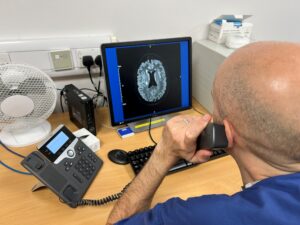
A new report outlines the findings of 14 projects which identified and tested promising innovations to support post-pandemic ways of working in the NHS.
The NHS Insights Prioritisation Programme (NIPP) was launched in 2021 to contribute to the recovery from COVID-19, build resilience and deliver benefits to patients.
Health innovation networks (HINs) and the National Institute for Health and Care Research (NIHR) Applied Research Collaborations (ARCs) teamed up for the projects, benefitting from each other’s unique skills and links with system partners. Each project received a share of £4.2m funding from NHS England (NHSE) and the Accelerated Access Collaborative (AAC).
The Oxford and Thames Valley partnership evaluated virtual outpatient clinics for transient ischaemic attack (TIA)/mini-stroke in the South East of England. Tracey Marriott, our Director of Clinical Innovation Adoption, said: “The pandemic forced us to think and act differently. We’re now more open to harnessing the potential of technology.” Read more in Tracey’s blog.
David Hargroves, the Clinical Lead for Stroke – South East at NHS England, was a member of our steering group. He said: “The delivery of high-quality rapid access TIA services is paramount in reducing the burden of recurrent stroke through early treatment.
“This work offers a unique and highly valuable insight into the patient and clinician experience of the varying models of face-to-face and virtual consultations.”
Nationally, the 14 projects tested and evaluated innovative approaches within their local Integrated Care Systems (ICSs). Each project focused on four priority areas:
- Remote consultation – a discussion between a clinician or patient which is not carried out face-to-face.
- Remote monitoring – using technology to support people at home to collect clinical data and share it securely with a clinician.
- New approaches to service delivery – improving services, particularly for those experiencing health inequalities for access to services.
- Health and social care workforce innovation – how staff can help innovation in service delivery and develop new ways of working.
An independent evaluation of the programme concluded that NIPP successfully facilitated a structured approach for the funding and acceleration of innovations and interventions. It also noted that the programme had cemented existing relationships between health innovation networks and NIHR ARCs, which may lead to more joint working in future.
- The full evaluation is available here, together with the project and executive summary reports, and links to a series of podcasts and blogs about the programme.
- Read the summary report on the Oxford & Thames Valley evaluation of virtual TIA clinics here
- Read more about the Oxford & Thames Valley project here

